依赖于第三方 SNMP4j 来实现 snmp 的 get、walk 功能,
主要实现了如下功能:
一、snmp get 获取单个 OID 的值
二、snmp get 同步和异步的方式获取多个 OID 的值
三、snmp walk 的方式
四、补充 SnmpUtil.java 代码
[一]、 snmp get 获取单个 OID 的值
SnmpGet.java
package com.michael.snmp4j;
import java.io.IOException;
import java.util.Vector;
import org.snmp4j.CommunityTarget;
import org.snmp4j.PDU;
import org.snmp4j.Snmp;
import org.snmp4j.event.ResponseEvent;
import org.snmp4j.mp.SnmpConstants;
import org.snmp4j.smi.OID;
import org.snmp4j.smi.VariableBinding;
import org.snmp4j.transport.DefaultUdpTransportMapping;
import com.michael.snmp4j.util.SnmpUtil;
/**
* @see http://sjsky.iteye.com
* @author Michael
*/
public class SnmpGet {
private static int version = SnmpConstants.version1;
private static String protocol = "udp";
private static int port = 161;
/**
*
* @param args
*/
public static void main(String[] args) {
�
String ip = "192.168.8.254";
String community = "public";
String oidval = "1.3.6.1.2.1.1.3.0";
SnmpGet tester = new SnmpGet();
tester.snmpGet(ip, community, oidval);
}
@SuppressWarnings("unchecked")
private void snmpGet(String ip, String community, String oid) {
String address = protocol + ":" + ip + "/" + port;
CommunityTarget target =
SnmpUtil.createCommunityTarget(address,
community, version, 2 * 1000L, 3);
DefaultUdpTransportMapping udpTransportMapping = null;
Snmp snmp = null;
try {
PDU pdu = new PDU();
// pdu.add(new VariableBinding(new OID(new int[]
// {1,3,6,1,2,1,1,2})));
pdu.add(new VariableBinding(new OID(oid)));
pdu.setType(PDU.GET);
udpTransportMapping = new DefaultUdpTransportMapping();
udpTransportMapping.listen();
snmp = new Snmp(udpTransportMapping);
// 发送同步消息
ResponseEvent response = snmp.send(pdu, target);
System.out.println("PeerAddress:" +
response.getPeerAddress());
PDU responsePdu = response.getResponse();
if (responsePdu == null) {
System.out.println(ip + ":Request time out");
} else {
Vector vbVect = responsePdu.getVariableBindings();
System.out.println("vb size:" + vbVect.size());
if (vbVect.size() == 0) {
System.out.println(" pdu vb size is 0 ");
} else {
Object obj = vbVect.firstElement();
VariableBinding vb = (VariableBinding) obj;
�
System.out.println(vb.getOid() + " = " +
vb.getVariable());
}
}
System.out.println("success finish snmp get the oid!");
} catch (Exception e) {
System.out.println("SNMP Get Exception:" + e);
} finally {
if (snmp != null) {
try {
snmp.close();
} catch (IOException ex1) {
snmp = null;
}
}
if (udpTransportMapping != null) {
try {
udpTransportMapping.close();
} catch (IOException ex2) {
udpTransportMapping = null;
}
}
}
}
}
[二]、snmp get 同步和异步的方式获取多个 OID 的值
同步实现方法:SnmpGetList.java
package com.michael.snmp4j;
import java.io.IOException;
import java.util.ArrayList;
import java.util.List;
import org.snmp4j.CommunityTarget;
import org.snmp4j.PDU;
import org.snmp4j.Snmp;
import org.snmp4j.event.ResponseEvent;
import org.snmp4j.mp.SnmpConstants;
import org.snmp4j.smi.OID;
import org.snmp4j.smi.VariableBinding;
import org.snmp4j.transport.DefaultUdpTransportMapping;
�
import com.michael.snmp4j.util.SnmpUtil;
/**
* @see http://sjsky.iteye.com
* @author Michael
*
*/
public class SnmpGetList {
private static int version = SnmpConstants.version1;
private static String protocol = "udp";
private static int port = 161;
/**
*
* @param args
*/
public static void main(String[] args) {
String ip = "192.168.8.254";
String community = "public";
SnmpGetList tester = new SnmpGetList();
List oidList = new ArrayList();
oidList.add(".1.3.6.1.2.1.1.1.0");
oidList.add(".1.3.6.1.2.1.1.3.0");
oidList.add(".1.3.6.1.2.1.1.5.0");
// synchronous
tester.snmpGet(ip, community, oidList);
}
/**
*
* @param ipAddress
* @param community
* @param oid
*/
private void snmpGet(String ipAddress, String community,
List oidList) {
String address = protocol + ":" + ipAddress + "/" + port;
CommunityTarget target =
SnmpUtil.createCommunityTarget(address,
community, version, 2 * 1000L, 3);
�
DefaultUdpTransportMapping transport = null;
Snmp snmp = null;
try {
PDU pdu = new PDU();
pdu.setType(PDU.GET);
for (String oid : oidList) {
pdu.add(new VariableBinding(new OID(oid)));
}
transport = new DefaultUdpTransportMapping();
transport.listen();
snmp = new Snmp(transport);
ResponseEvent response = snmp.send(pdu, target);
PDU resPdu = response.getResponse();
if (resPdu == null) {
System.out.println(ipAddress + ":Request time out");
} else {
System.out.println(" response pdu vb size is " +
resPdu.size());
for (int i = 0; i < resPdu.size(); i++) {
VariableBinding vb = resPdu.get(i);
System.out.println(vb.getOid() + "=" +
vb.getVariable());
}
}
} catch (Exception e) {
System.out.println("SNMP GetNext Exception:" + e);
} finally {
if (snmp != null) {
try {
snmp.close();
} catch (IOException ex1) {
snmp = null;
}
}
if (transport != null) {
try {
transport.close();
} catch (IOException ex2) {
transport = null;
}
}
}
�
}
}
异步实现方法:SnmpGetListAsyn.java
package michael.snmp.snmp4j;
import java.util.ArrayList;
import java.util.List;
import michael.snmp.util.SnmpUtil;
import org.snmp4j.CommunityTarget;
import org.snmp4j.MessageDispatcherImpl;
import org.snmp4j.PDU;
import org.snmp4j.Snmp;
import org.snmp4j.event.ResponseEvent;
import org.snmp4j.event.ResponseListener;
import org.snmp4j.mp.MPv1;
import org.snmp4j.mp.MPv2c;
import org.snmp4j.mp.MPv3;
import org.snmp4j.mp.SnmpConstants;
import org.snmp4j.smi.OID;
import org.snmp4j.smi.VariableBinding;
import org.snmp4j.transport.DefaultUdpTransportMapping;
import org.snmp4j.util.MultiThreadedMessageDispatcher;
import org.snmp4j.util.ThreadPool;
import org.snmp4j.util.WorkerPool;
/**
* asynchronous send PDU
* @see http://sjsky.iteye.com
* @author Michael
*
*/
public class SnmpGetListAsyn {
private static int version = SnmpConstants.version1;
private static String protocol = "udp";
private static int port = 161;
/**
*
�
* @param args
*/
public static void main(String[] args) {
String ip = "192.168.8.254";
String community = "public";
SnmpGetListAsyn tester = new SnmpGetListAsyn();
List oidList = new ArrayList();
oidList.add(".1.3.6.1.2.1.1.1.0");
oidList.add(".1.3.6.1.2.1.1.3.0");
oidList.add(".1.3.6.1.2.1.1.5.0");
// asynchronous
tester.snmpAsynGet(ip, community, oidList);
}
/**
*
* @param ipAddress
* @param community
* @param oid
*/
private void snmpAsynGet(String ipAddress, String community,
List oidList) {
String address = protocol + ":" + ipAddress + "/" + port;
CommunityTarget target =
SnmpUtil.createCommunityTarget(address,
community, version, 2 * 1000L, 3);
DefaultUdpTransportMapping transport = null;
Snmp snmp = null;
try {
WorkerPool threadPool =
ThreadPool.create("TestSNMPWorkPool", 2);
MultiThreadedMessageDispatcher dispatcher = new
MultiThreadedMessageDispatcher(
threadPool, new MessageDispatcherImpl());
transport = new DefaultUdpTransportMapping();
snmp = new Snmp(dispatcher, transport);
snmp.getMessageDispatcher().addMessageProcessingModel(new
snmp.getMessageDispatcher().addMessageProcessingModel(new
snmp.getMessageDispatcher().addMessageProcessingModel(new
MPv1());
MPv2c());
MPv3());
�
snmp.listen();
PDU pdu = new PDU();
pdu.setType(PDU.GET);
for (String oid : oidList) {
pdu.add(new VariableBinding(new OID(oid)));
}
ResponseListener listener = new ResponseListener() {
public void onResponse(ResponseEvent event) {
event.getSource()).cancel(event.getRequest(), this);
((Snmp)
null");
Text:"
Success!!!");
PDU response = event.getResponse();
PDU request = event.getRequest();
System.out.println("[request]:" + request);
if (response == null) {
System.out.println("[ERROR]: response is
} else if (response.getErrorStatus() != 0) {
System.out.println("[ERROR]: response status"
+ response.getErrorStatus() + "
+ response.getErrorStatusText());
} else {
System.out.println("Received response
for (int i = 0; i < response.size(); i++) {
VariableBinding vb = response.get(i);
System.out.println(vb);
}
}
}
};
snmp.send(pdu, target, null, listener);
System.out.println("asynchronous send pdu wait for
response...");
} catch (Exception e) {
System.out.println("SNMP GetNext Exception:" + e);
}
}
�
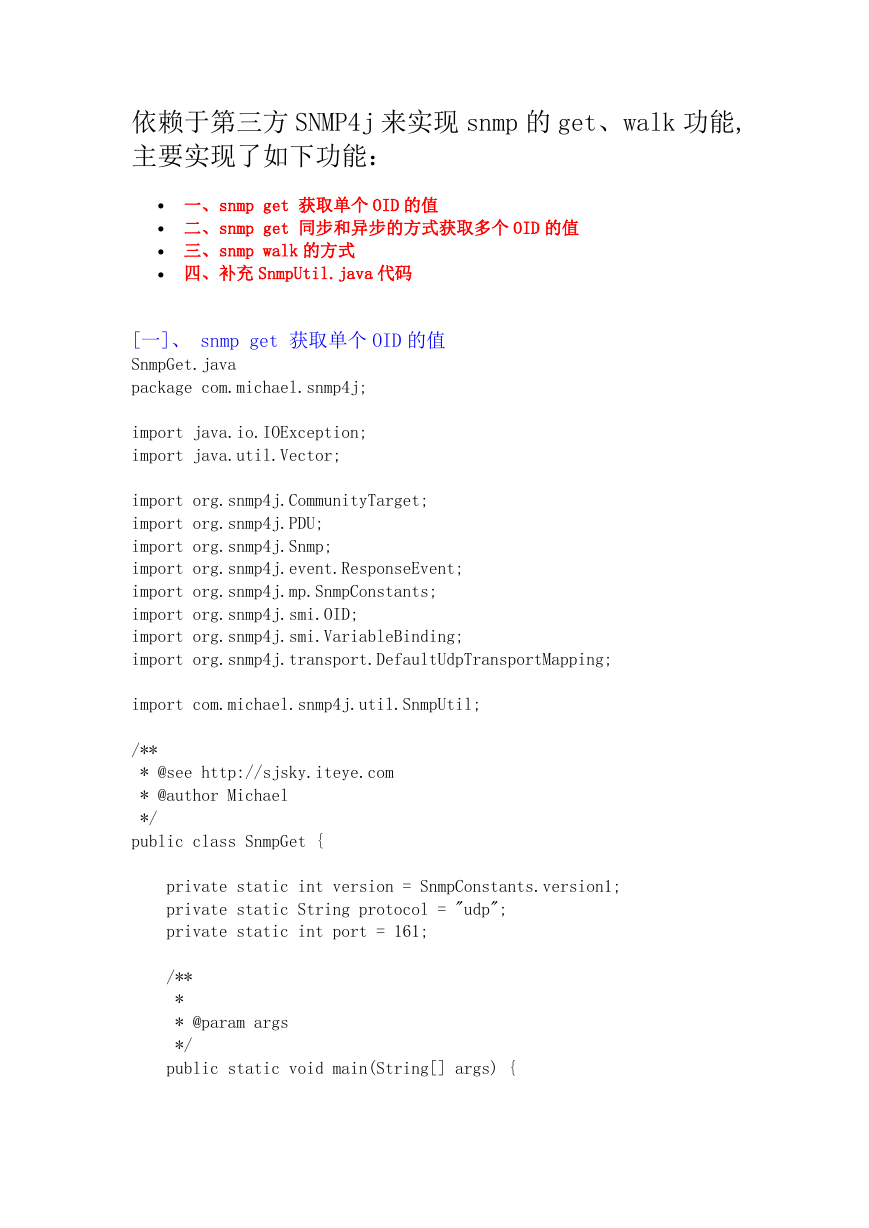



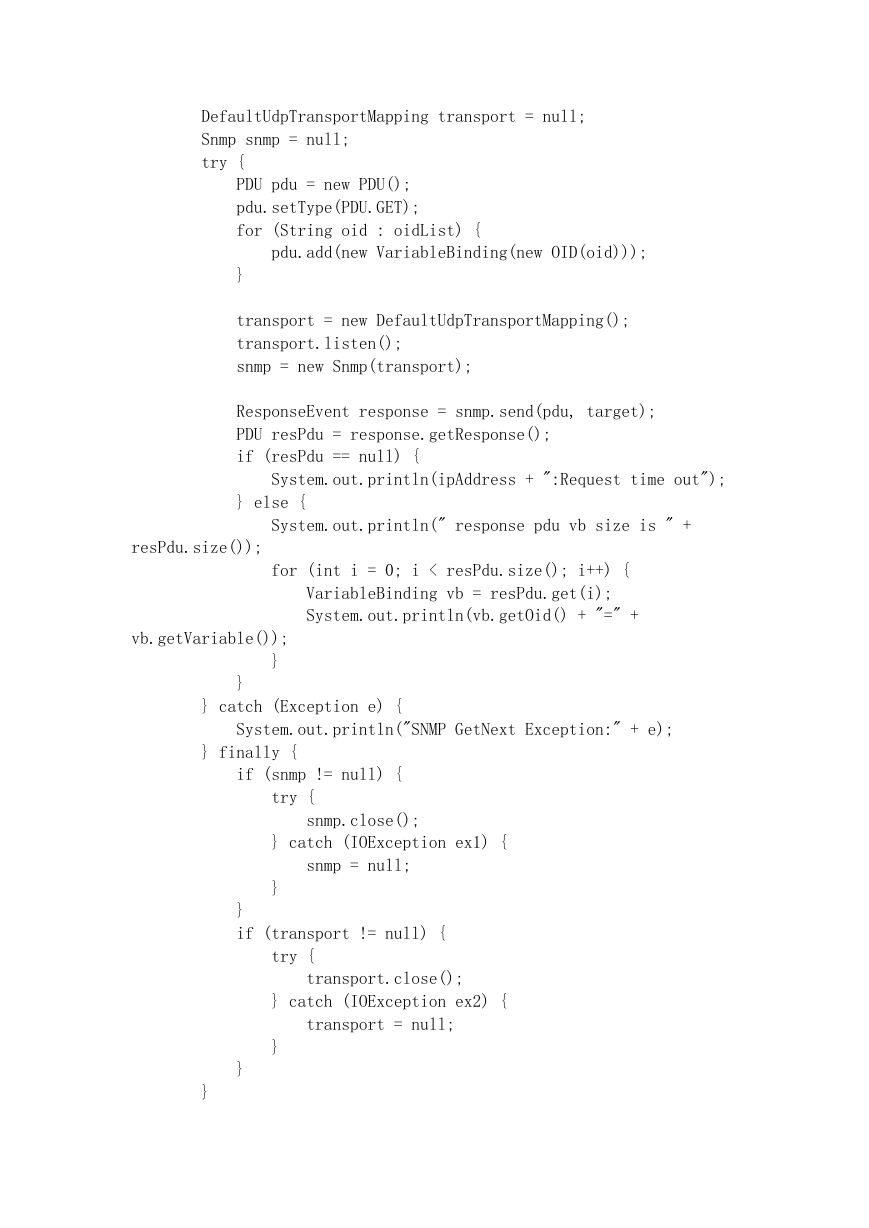
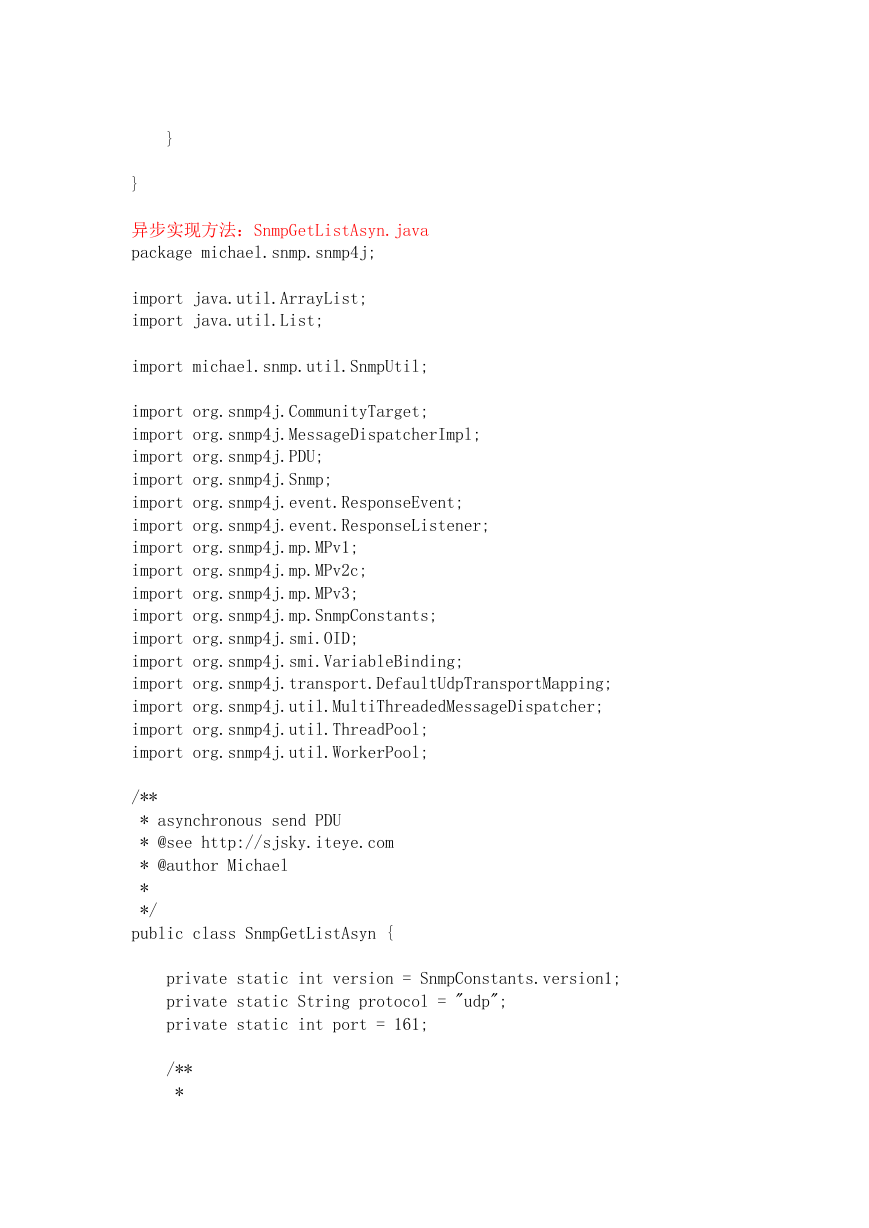
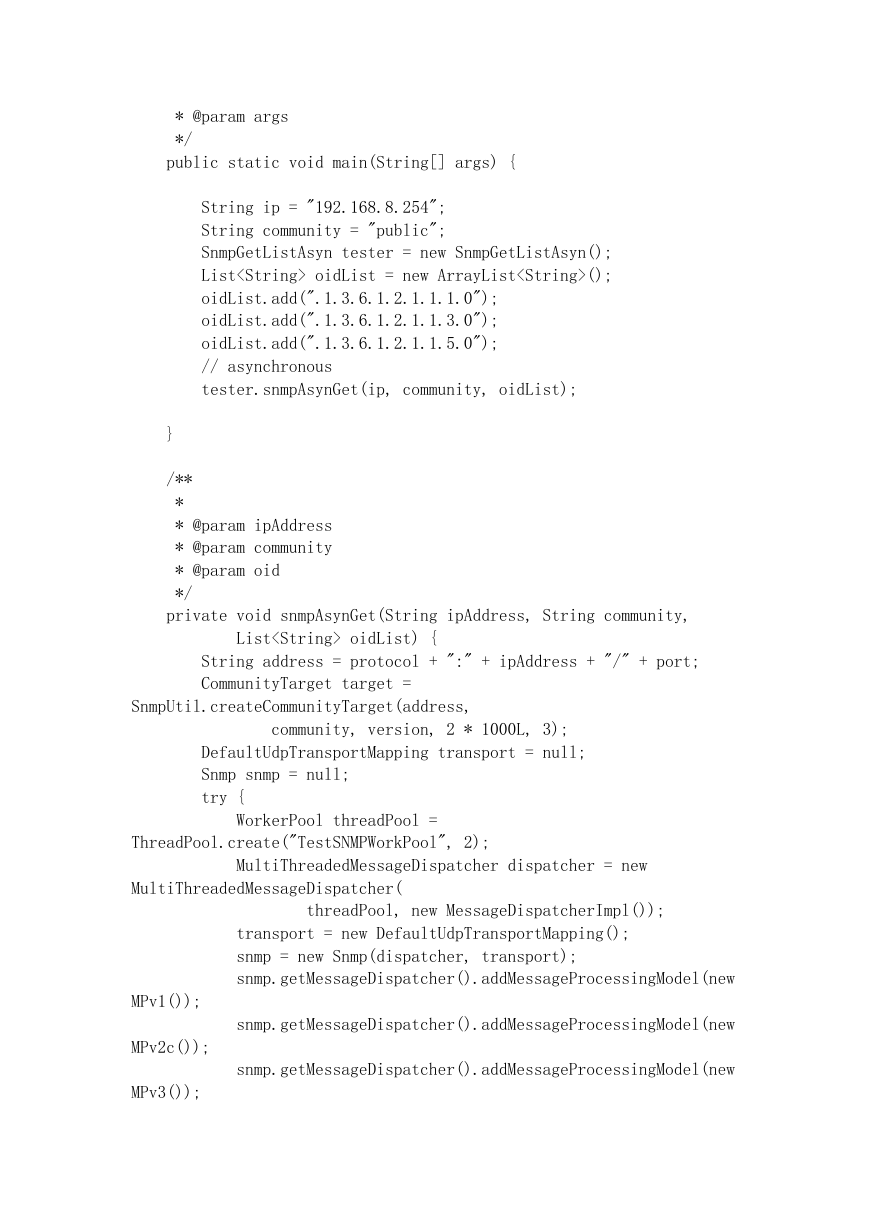
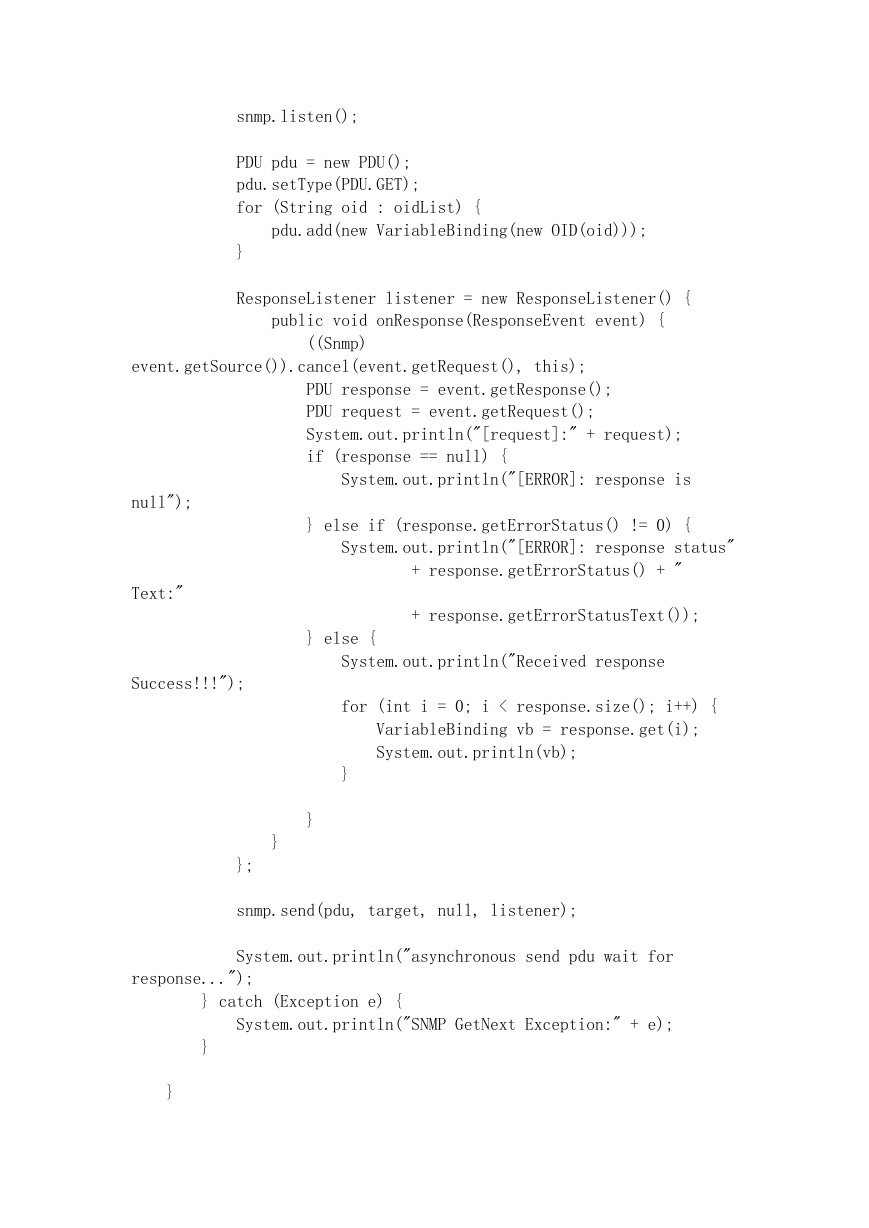








 2023年江西萍乡中考道德与法治真题及答案.doc
2023年江西萍乡中考道德与法治真题及答案.doc 2012年重庆南川中考生物真题及答案.doc
2012年重庆南川中考生物真题及答案.doc 2013年江西师范大学地理学综合及文艺理论基础考研真题.doc
2013年江西师范大学地理学综合及文艺理论基础考研真题.doc 2020年四川甘孜小升初语文真题及答案I卷.doc
2020年四川甘孜小升初语文真题及答案I卷.doc 2020年注册岩土工程师专业基础考试真题及答案.doc
2020年注册岩土工程师专业基础考试真题及答案.doc 2023-2024学年福建省厦门市九年级上学期数学月考试题及答案.doc
2023-2024学年福建省厦门市九年级上学期数学月考试题及答案.doc 2021-2022学年辽宁省沈阳市大东区九年级上学期语文期末试题及答案.doc
2021-2022学年辽宁省沈阳市大东区九年级上学期语文期末试题及答案.doc 2022-2023学年北京东城区初三第一学期物理期末试卷及答案.doc
2022-2023学年北京东城区初三第一学期物理期末试卷及答案.doc 2018上半年江西教师资格初中地理学科知识与教学能力真题及答案.doc
2018上半年江西教师资格初中地理学科知识与教学能力真题及答案.doc 2012年河北国家公务员申论考试真题及答案-省级.doc
2012年河北国家公务员申论考试真题及答案-省级.doc 2020-2021学年江苏省扬州市江都区邵樊片九年级上学期数学第一次质量检测试题及答案.doc
2020-2021学年江苏省扬州市江都区邵樊片九年级上学期数学第一次质量检测试题及答案.doc 2022下半年黑龙江教师资格证中学综合素质真题及答案.doc
2022下半年黑龙江教师资格证中学综合素质真题及答案.doc